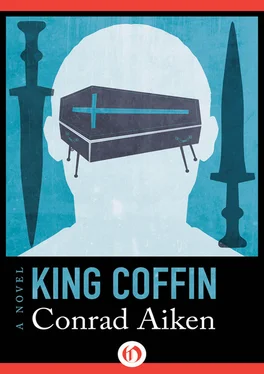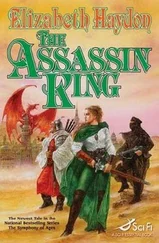XII What It Is to Be a Stranger
If the whole apartment house had seemed hostile, on his return to it in the evening, and uglier and more prisonlike than ever after his telephone talk with Jones from the pay station in the hall (in the shadow of the elevator), it now seemed, in the soundless turmoil of time, nothing but an enormous and elaborate trap. Lying down for the twentieth time, fully dressed, on the dark bed in the dark room, he stared through the little square of window: not for any sight of the clouded and hurrying sky, but for a sharper vision of Hampden Hall. In mid-air, it was if he could reverse himself, return from halfway across the street (or from the roof of Widener Library) to see his own building from outside; as if in fact he were a bird, looking in through his own window, looking cynically downward at the dark figure on the bed which was himself. Seen thus, under the hurrying heavens, the building was simply nothing but a monster: it stood upright and unapologetic, in the midst of the mad universe, a queer hard brickwork organism with hot metal arteries and tingling nerves of copper, breathing the night air through huge vent holes on a flat roof of tar and gravel. Inside it were the human lice on which it nourished itself — it had gathered them together for the night. Among these of course was himself, lying there with his hands beneath his head; now staring out past the roof of the A.D. Club to meet the gaze of his projected spirit, which hung there like an angel in modern dress, now returning for a scrutiny of the little Buddha on its shelf. It was a prison, a trap; but it was more than that, worse than that — the whole building had seemed somehow sinister as he approached it; and after the telephone talk with Jones it had begun to seem definitely evil . The impulse to take flight had been sharp enough, he had wanted to hurry out again at once, to go anywhere, to drive a car madly into the country, even perhaps simply to go to town and get drunk. But disgust had inhibited this impulse, disgust and something else — a fear, a suspicion, an uneasy edge of self-doubt. Not fear, no — disgust, disgust, disgust, this queer new horror which, rising periodically in the back of his mind, almost on the back of his tongue, made him want to close his eyes lest he should see the world in the very act of changing its shape. And all this was not because of the telephone talk with little Jones, of course not, not at all — at most the telephone talk was a part of it, it had certainly not changed anything. No, what was sickening was the way in which all the details of his plans, his scheme, were now at every point working so well together but in a sense not quite his own : as if his own speech came back to him, from a mouthpiece, translated into an unfamiliar language. There was an ugly sort of distortion in it, everything was meanly and sneeringly caricatured, as by concave and convex mirrors; it was like the strange drawling and snarling sounds which quite ordinary and pleasant words or voices can become in a dream. With a desire to escape this he had thought of going to town, or even of simply taking a long walk, but at once to realize that the thing was inescapable. Much better had been the impulse to put it all down, to make the last entries in his journal of the adventure, add the last date to the column of dates on the map, and even to attempt to codify these impressions as if for the novel. Almost immediately, he had found himself trying to outline a queer sort of essay, a philosophic essay, but not quite philosophic either, perhaps psychological was what he meant, but of course without in the least being able to get at the thing: he had written intermittently for hours, now and again going out to walk from end to end of the long dimly lighted corridor, pausing at the one end to look down toward the river, and at the other to watch a late car or two speeding urgently along Massachusetts Avenue. All night, the world had seemed full of clocks — the grandfather clock in the professor’s apartment sent its soft tyang through the walls, Memorial Hall and Saint Paul’s dutifully and sadly echoed each other, the dreary wooden steeple of the Unitarian Church added its deeper note; but even with these to mark the passage of his feet along the corridor, the expensive shoes placed swiftly one in front of the other, the heels slightly scuffed and dragging, his eyes intent on the slight swerve with which the right foot as if carelessly placed itself, even with these the sense of time had not been so much marked as diffuse. He had got up only to sit down again, had flung himself on the bed only again to rise and begin walking, or had paced the crooked corridor only once more to sit down and try to write. It might be four o’clock, it might be five. Above Beck Hall, the sky had begun to brighten. There was a little patter of rain, a little grazing of rain, on the window. It was as if it had touched his skin, it stung him to a sudden but perhaps false alertness, he jumped up and went back to the table, looked sharply at the map, sat down.
His father’s letter—
It lay on the floor between his feet, the phrases of it looked up at him like round eyes — he had flung it there to forget it, flung it down in anger and hatred, but now it watched him. The phrases had of course stuck in his mind, only because they had so sickened him with anger and disgust — the typewritten phrases of a typical businessman’s smoothness and complacency. I do not presume to advise — as you are doutbless aware — far be it from me — I can only report that the writer of this anonymous letter says — tired of your irresponsible behavior — dragging my name into the police courts — not enough that you were a continual worry to your mother — and so on and so on.
Somebody had written to him, obviously — probably Sandbach. And Gerta must have given him the address.
And they were threatening police action?
He looked down at it, pushed it farther under the table with his toe. The hard, firm, coarse signature, written with large open letters and a heavy pen, lay there like some ugly relic of his own past, something hateful and obscene, something to be destroyed. The angry energy of hypocrisy—
To find this waiting for him in the letter box, with its menacing special delivery stamp, had undoubtedly made its contribution to his increasing sense of evil and ugliness, it had at once occurred to him — so right was his intuition — that it might be better to destroy it unread; but also it had occurred to him that it might actually contain something in the way of news . It was as if, even through the unopened envelope, he had been able to feel a threat, the encroachment of something: perhaps, however, only because the arrival of a letter from his father was in itself so unusual. He had waited, called up Jones first — keeping the letter in his pocket — and it was odd now to consider the intimate and by no means accidental connection between the two things. So intimate, in fact, that had he read the letter first he might not have telephoned to Jones at all. At any rate, it would have been necessary to consider it, to consider whether in the light of this threat the immediate project had not better be abandoned, the meeting with Jones postponed; perhaps even to consider the substitution of some one else for Jones, since it was now possible that Toppan knew who Jones was. The letter lay in his pocket speaking of this, while he himself spoke with Jones; just as later, in his room, the conversation with Jones spoke softly and disconcertingly through the curt phrases of the letter. It was peculiarly right that the two things should thus have coincided in time — but it was also peculiarly unpleasant.
Читать дальше












